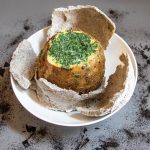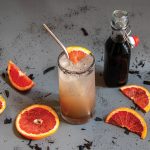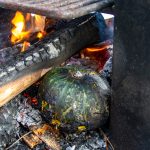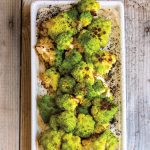 liquid assets
liquid assets
monks’ ale – care, prayer, hops and yeast create a hit formula
By Wolf Schnieder, Photos by Sergio Salvador
If a robed Benedictine monk leading a rigorous spiritual life in a remote New Mexico monastery, who, upon finishing his seventh daily prayer session, decides to pour himself a tall, cold brewski, seems an unlikely scenario, think again. Monks brewing beer is a tradition that began in the Middle Ages in Europe, when monks were innkeepers and repositories of knowledge and that tradition is gaining new popularity today in northern New Mexico.
Monks’ Ale, brewed under the auspices of the Abbey Beverage Company, LLC, which is majority owned by Christ in the Desert Monastery in Abiquiu, has become so popular that distributors outside New Mexico are inquiring about obtaining the product, which has been in production for the last five years at both the Pecos Benedictine Monastery, where a small pilot brewery has been in operation, and Sierra Blanca Brewing Company in Moriarty, where the majority of the beer is made. Both are supervised by the Christ in the Desert Monastery. Earlier this year, Christ in the Desert Monastery began steps to move the pilot brewery from the Pecos monastery to their own monastery in Abiquiu. They planted a hops field and are now planning for a brewery building.
Says Berkeley T. Merchant, general manager of Abbey Beverage Company, “The Monks’ Ale business is alive and well. We are selling beer throughout New Mexico through the Admiral Beverage Corporation. We produce beer for draft consumption as well as in bottled form. The Christ in the Desert Monastery has bought out 100% of the interest that the monastery in Pecos had in Abbey Beverage Company. That happened in the spring of this year.”
Merchant, 63, spent 30 years in Portland, OR, as an entrepreneur running businesses. He moved to Santa Fe four years ago and began overseeing Santa Fe’s Monks’ Corner retail store for the Christ in the Desert Monastery, and working on the Monks’ Ale business venture. “We are about to break ground on a separate building at Christ in the Desert that will be a small scale brewery to produce a draft beer,” he says. Sierra Blanca will continue to produce the bottled Monks’ Ale.
If a monastery brew house in remote Abiquiu sounds incompatible with the solitary spiritual life, Merchant explains, “The religious orders need to sustain themselves. None of them call Rome and say, `Hi, send us more money.’ It works the other way around.” And it’s worked so well, he adds, “We’re in the process of obtaining final approvals from the federal government to brew and package a second beer, Monks’ Wit, a light beer, a classic Belgium wheat beer.”
Merchant is an oblate, someone who deals with the outer world for the monks. “The monks, of course, basically manage and supervise me, because they are the majority holders of the company,” he clarifies. “I consult frequently with the monks over operational issues, advertising, designing marketing materials, so they meet with their approval.” The monks participate in tastings and, “The monks help in the hop yard and when we build the brewery in Abiquiu, several monks have expressed a strong interest in getting directly involved with the brewing process.” Also, “The monastery is in the process of reconstituting its farm business with plans to grow herbs and other crops.”
All of this is consistent with history, points out Merchant. “Historically, members of the Benedictine order were the innkeepers of Europe. If you valued your life in the Middle Ages when you traveled in Europe, you traveled from monastery to monastery. Many of the monasteries made beer because that was a lot safer than drinking the water.”
Surrounded by wilderness, the 300 acre Monastery of Christ in the Desert used to be a working ranch. Now a Benedictine monastery, its buildings include a guesthouse and gift shop that sells soaps, candles, and body lotions produced at the monastery. Edifices are mostly constructed of straw bale and adobe, and Gregorian chants often resonate through the pristine mountain air.
About 34 monks are in residence, undertaking seven daily prayer services, commencing at 4am.
“I am happy to have the beer license move here,” says Abbot Philip, who heads the Christ in the Desert Monastery. “It will help the monks be more involved in the actual operation of producing beer, which is something that appeals to me. Just as we are now beginning to grow hops and that makes me happy because we are able to use our agricultural lands.” He points out, “Even today in many parts of Europe it is common to find liquors made by monasteries, whether it be wine, beer, or other types of alcoholic beverages.”
Perfecting the Monks’ Ale recipes is Brad Kraus, 53, based in Santa Fe. Kraus is the brew master for Abbey Beverage Company, responsible for quality control. “Our sales are good,” Kraus reports. Monks’ Ale is currently distributed widely in New Mexico, including at Whole Foods Market, Sunflower Farmers Market, Albertson’s, Kaune’s, The Pink Adobe, Chocolate Maven and La Casa Sena. At retail, it typically sells for $8.99 a six pack, he says.
Kraus was one of the founders of Monks’ Ale, an enterprise conceived about eight years ago. It wasn’t a rush project. “We call New Mexico the land of manaña, but at the monastery they make it an art form. Time is just kind of a continuum for them,” Kraus recalls. “It took some time to germinate, then we hatched a plan to start it with draft beer only, just kegs.” They decided to create the pilot brewery at the Pecos monastery, while Sierra Blanca would handle the bulk of the brewing and eventually expand into the bottled beer.
Why Pecos and not Abiquiu initially? “At that time, it seemed more prudent to have better accessibility,” reasons Kraus. The Pecos monastery is on the outskirts of the town of Pecos, whereas the Abiquiu monastery is 13 miles down a dirt road. about 27 miles from Abiquiu village. With the Monks’ Ale brand now established, “I think centralizing everything makes sense for us now,” Kraus says.
Monks’ Ale is a Belgian abbey style ale. “A lot of these are double, at 7%, or triple, at 9% volume, like from the Belgian Trappist breweries. Yet some of the abbeys have single or enkel, which wasn’t sold to the outside. I thought it would be interesting to make a beer of that style – it’s 5% alcohol and very rich and full-flavored. We’re using a yeast that originated at the Trappist monastery at Orval, and a blend of Belgian, Canadian and U.S. malts, along with all European hops, called Noble Hops,” details Kraus.
Whereas major breweries sometimes add corn and rice as inexpensive adjuncts, only four ingredients are the basis of the amber Monks’ Ale: water, barley malt, hops, and yeast.
Monks’ Ale is made in small batches and its popularity is part of a larger trend toward craft breweries. Twenty years ago there were only three craft breweries in New Mexico, Kraus estimates. Nowadays, there are about two dozen, many of them brew pubs that make handcrafted batches of the beer which they serve, like Blue Corn Café & Brewery, Second Street Brewery, and Chama River Brewing Company.
Monks’ Ale is distinctly fruity and spicy, with a clove flavor and hints of apricot, plum and honey. Kraus recommends pairing it with a soft, ripened goat’s cheese, aged Gouda, salmon, New Mexico lamb, or even a peach crisp dessert.
Kraus, who is also the brew master for Blue Corn Café & Brewery and acting brew master at Isotopes Brewing Co., began as a home brewer after earning a chemistry degree at Rice University. “Honestly, making beer is fairly easy. Making great beer is what’s difficult,” he comments. Now that the Monks’ Ale reputation is spreading, with distribution outside the state a possibility, Kraus is thinking ahead once again. “We have to have more production capacity, more kegs, more packaging materials, and get the beer licensed for sale in other states.”
The tagline for Monks’ Ale is “made with care and prayer,” which leads Kraus to assure, “If there’s one thing the monks know about, their work is prayer. And we take great care in making the product.”
Wolf Schneider has been editor in chief of the Santa Fean, editor of Living West, and consulting editor at Southwest Art.
Edible celebrates New Mexico's food culture, season by season. We believe that knowing where our food comes from is a powerful thing. With our high-quality, aesthetically pleasing and informative publication, we inspire readers to support and celebrate the growers, producers, chefs, beverage and food artisans, and other food professionals in our community.







